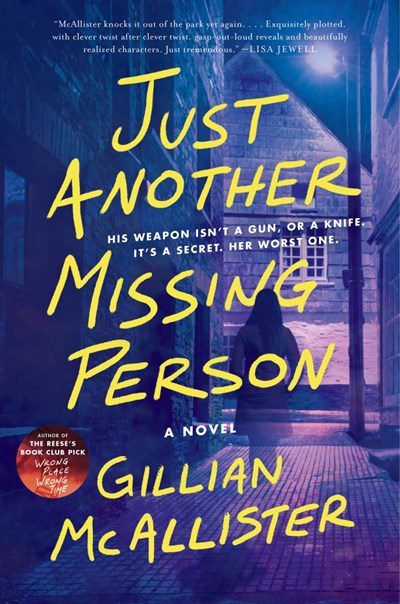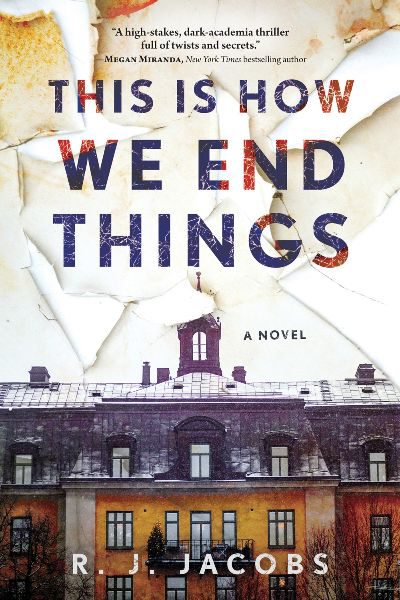In his acknowledgements, Rosson calls this “a wild fever dream of a novel,” and he nailed it. Where to start with this feral read? Since it’s a horror/suspense novel, the first gory moment seems apt: when a crime boss’s enforcers threaten a man with a drug addiction who owes a payment and the man asks, “What’re you gonna do? Knock my teeth out?” He then goes on to do the job himself, with his own filthy fingers. The enforcers find a severed hand during their work, one that causes those nearby to feel the need to do tremendous violence, the urge “[slithering] in. It floats on a dark wave.” The gore gets more sophisticated—“make me a necklace from the heads of your children…make me a red veil from their latticed veins”—only adding to the supernatural head-spinning. At the same time, we follow the life…if he or it is alive…of a being called Saint Michael, a secret captive of the U.S. government. Saint Michael can sometimes see visions of future events, especially when periodically “encouraged” by the agonizing process of government agents trimming his wings. In counterpoint to the government actions we meet a musician, Katherine Moriarty, who was very successful in her day but now is agoraphobic, her closed-in life perhaps related to the bizarre goings-on elsewhere in the novel. All converge in a terrifying episode in Portland, Oregon, that will surely be a highlight of the movie that is already being made of this terrific novel. Every word here is crafted to impart just the right level of revulsion, fear, and, at times, wonder. Get ready for awards nods for this work as well as comparisons to the works of Cormac McCarthy and Justin Cronin.
Suspense
Judith and Katherine, or as they prefer, Jude and Kat, are mirror-image identical twins (they have the same features on opposite sides of their bodies, such as the same birthmark on opposite shoulders). But there is one big difference. Jude can remember all of their 22 years, but Kat has recently survived a terrible car accident that has left her with amnesia. Experiencing everything “again for the very first time,” she relies on Jude to tell her their life story, because, Jude says, their mother is dead and their father took off years ago. Some things seem puzzling, such as why the photos of their before-the-accident European trip don’t show the sisters at all, only landmarks. Readers learn why in those sections of the book that look at life before the crash, when the girls and their mother left mainstream society to live with the controlling King Bash, whose mantra was “What you think, is.” The pressure to will happiness and satisfaction into being, and the child abuse led by Bash, brews a toxic storm that Jude tries to keep in their past. But the past threatens to explode when a mysterious figure starts turning up at random places in the present. Kahler has a quietly compelling way of revealing secrets and of portraying a close sibling bond, creating an unusual debut novel (as Karen Abbott, Kahler is an Edgar Award nominee for Best Fact Crime for The Ghosts of Eden Park) that will be a hit with those who enjoyed the recent religious-cult documentaries Shiny Happy People and Keep Sweet: Pray and Obey
Isaka’s third book in this semi-series—the first, Bullet Train, was made into a popular film featuring Brad Pitt and Sandra Bullock—takes a bit of a departure. Yes, we’re focused on a genius hit man, in this case Kabuto. He’s beholden to the Doctor, an actual doctor who hilariously uses medical terminology as code to describe the hits. They’re oftentimes bizarre, wildly creative, or just plain funny. But Kabuto is over it. He wants out, except the Doctor isn’t ready to lose such talent and forces Kabuko to pay his way out, taking down some other professional assassins as his swan song. But for all the time we spend in Tokyo’s criminal underground, this book is more grounded in Kabuko’s life as a family man with a teen son and a wife, who are convinced his work is in office supplies! Kabuto’s relationship with his wife is uniquely fraught; he keeps a journal of phrases useful to appease her, while his son is remarkably loving towards his browbeaten dad. Featuring a professional killer who cringes because he ate the last of his wife’s favorite pudding, this book is poignant, sweet, and full of surprises. No need to read the earlier novels to appreciate this title.
The bitchiness we loved in Dial A for Aunties is back with a vengeance. This time, the author takes us, via flashbacks, to the nervous, early days of an American student at Oxford University. Jane Morgan’s mother has drilled into her daughter that she can’t write and can’t do anything else right either, and Oxford isn’t for the likes of her. So it’s a relief when Janemeets the confident, beautiful Thalia Ashcroft. For Jane, it’s obsession, if not love, at first sight. She’ll do anything to keep Thalia’s friendship, and is desperate to keep her from Ami, a blithely rich student who looks like competition for friendship with Thalia. It’s a struggle—everything’s so hard for Jane, who must continually remind herself that her sociopathic behaviors—“antisocial (check), hostile (check), irresponsible (check)”—must be kept under wraps if she’s to get ahead. Then everything unravels, a situation hinted at in the present-day section of the book as the time Jane left Oxford after an unnamed disaster. What happened, and how the women confront each other and the event’s aftermath all these years later, is a thrilling tale filled with twists, unreliable narrators, and absurdness of the best kind. For Dial A for Aunties fans and anyone who likes a friendship drama.
“Everybody knows everything about you in this stupid town. And they know nothing.” What people in Madeline Martin’s rural New York town know about her is that she’s the daughter of the town’s longtime, beloved sheriff and she owns The Next Chapter, her dream bookstore. They also know, but rarely mention, that she survived a brutal attack ten years before, one that saw her friend Steph murdered and two other friends, sisters Ainsley and Sam, disappear. What they don’t know is that Maddie’s never recovered emotionally and longs to know what happened to her friends. There’s still no word on the missing teens, and it’s a few days before the anniversary of the attack, which also means Christmas is a few days off and the bookstore is humming. Superstar author Harley Granger chooses this as his moment to visit and start his research on whether the man doing time for the crime is guilty, what happened to Ainsley and Sam, and, most urgently, where a newly disappeared exotic dancer could be. All breathlessly documented on social media, of course. Fans of Unger will know her thrillers match top-notch writing with gripping stories; this one won’t disappoint in that regard and offers the bonus of a satisfying family story in Maddie and her father.
Ryan Summer helps a young woman named Evie Porter with a flat tire, and shortly afterward, they are inseparable in Elston’s twisty thriller. He falls head over heels for her, but in Evie’s case, the relationship is an assignment from her mysterious boss she has never seen, Mr. Smith. Her orders are to get close and obtain information about Ryan’s business. As time passes, she finds herself falling for her mark, and one evening, while meeting some of Ryan’s friends, she meets Lucca Marino. Evie’s real name is Lucca Marino, and this woman is using Evie’s real-life identity and background. It’s clear her boss has put a target on her back, and she will have to use all her manipulative skills to stay alive, even if that means she has no realistic chance of returning to her old life. Retirement is not an option. Elston has crafted a story that stretches credulity a bit, but works. Readers will be dying to finish this fast enough so they can decipher what’s going on, and it’s a guarantee that they’ll find the truth unexpected. Fans of Hank Phillippi Ryan and Megan Miranda should seek this out.
What do we know about lying? That one lie often begets others. That lies find a way of escaping their boundaries. And that knowledge of a lie can give you power over the liar. DCI Julia Day is leading the investigation into the case of a young woman who’s gone missing. A brilliant detective, Julia is slightly suspicious of this case—the pieces don’t quite fit together—when she’s carjacked and forced to agree to lie about the alleged perpetrator. Except the story hardly ends there. As the investigation unravels, more cold cases come alive and more lies are exposed. McAlister brilliantly leads us into the lives of parents, driven mad by grief, and Julia’s own relationship with her daughter, the well-spring of so many falsehoods. Readers will appreciate a police procedural that is deeply embedded in character. That moves adroitly between the lives of cops and civilians. And that explores the difficulty of making sound moral choices. McAlister is the author of Wrong Place Wrong Time, a Reese’s Book Club Pick.
Nothing was ever the same for Sara Linton after the night she was attacked. Though the police apprehended the culprit, Sara has struggled to deal with the trauma ever since. She’s now engaged to GBI Special Agent Will Trent, and they are crafting wedding plans. When Sara promises to pursue justice for another young woman, who dies, she has no idea that this will force her to confront the darkness and memories she has been avoiding for years. Will wants to help, and what they uncover leads to connected attacks with ties to recent incidents. Slaughter is a master of telling a story with horrific elements and spinning it to be both clinical and compelling. She dives into the characters we love and provides more insight into what has made them who they are, which makes them come alive on the page. The ABC television series Will Trent was recently renewed for a second season, and its popularity will steer readers to pick up this book. Whether a newcomer to the series or a fan who has read the previous entries, readers will find this one of the best to date.
A toxic workplace implodes as Jacobs (Always the First to Die) puts deception and its fallout under the microscope. The workplace, which darkly echoes the setting of the recent Netflix series The Chair, is North Carolina’s Dorrance University, but more specifically a six-person project within its psychology department. A professor and five graduate students, who embody the worst of what happens when coworkers see one another as family, are conducting an odd experiment. They fool students into thinking they are missing credits and must participate in an (unknown to them, mock) psychology study to graduate. The real purpose of the interaction is to gauge how willing students will be to lie when under pressure. That deception is just the beginning of the lies and manipulations that emerge in this story after one of the too tightly knit group is murdered, with further violence not far behind. Jacobs succeeds wonderfully in portraying a hothouse-type atmosphere in which everyone’s a suspect and the suspicions are just the latest inspiration for backbiting, accusations, and pettiness. Readers won’t see the ending coming and will relish the red herrings and twists along the way.
A brilliantly taut novella set over Christmas in 1989 England, revisited from the perspective of present-day New York. Ashley Smith is an American college student spending her junior year in London. An orphan, she has no holiday plans, until another student, Emma Chapman—they’re barely friends—invites her to her family’s manor house in the country. For an American, it’s pretty much “cozy Cotswold heaven”: a rambling home filled with cousins and friends, pine boughs and holly, smelly dogs and board games, plenty of alcohol, nightly hikes to the village pub, and absolutely no heat. Much of the narrative comes through Ashley’s diary, which is a real hoot in its Bridget Jones-ness, especially when she’s reporting on Adam, Emma’s supremely handsome brother. Except things start to get weird. A strange, little man is seen lurking on the wooded shortcut to the pub. Then Ashley learns that Adam is suspected of murdering a local girl several months before—but proof is lacking. Despite being short enough to read in one sitting, maybe with a pot of tea at the midpoint, this skillfully constructed work of crime fiction still manages to provide plenty of shock and awe.










